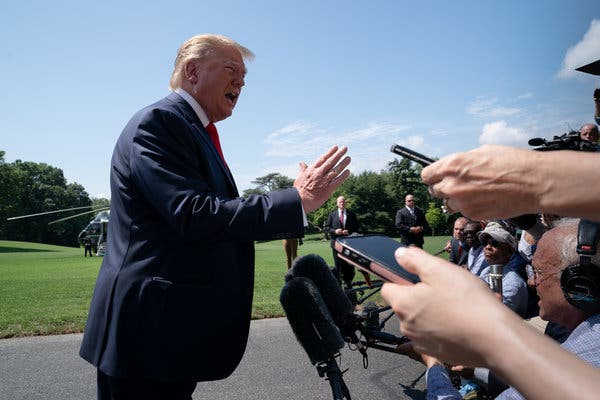
CreditErin Schaff/The New York Times
President Trump said Friday that the White House was writing an executive order to require pharmaceutical companies to offer the United States government among the lowest prices in the world, in comments that were not immediately clear to many experts on the country’s health care system.
“We’re working on a favored-nation clause, where we pay whatever the lowest nation’s price is,” Mr. Trump said to reporters Friday, specifying that an “executive order” was in the works. “Why should other nations like Canada — why should other nations pay much less than us? They’ve taken advantage of the system for a long time, pharma.”
The White House has made the high costs of prescription drugs a policy priority, and the Department of Health and Human Services has proposed a series of measures meant to help address that. But until today there had been no public mention of a broad executive order.
The administration is working on a plan that would use an index of international drug prices to set the price that Medicare pays for some drugs that are administered by doctors, such as cancer treatments. Last year, Mr. Trump used the phrase “favored-nation clauses” to describe that proposal, which would base the Medicare price on prices from more than a dozen countries, including Canada, Britain, Japan and Slovakia.
The price index idea, which the pharmaceutical industry and many medical providers have vigorously opposed, is still under review from the Office of Management and Budget and may begin as a five-year pilot program next year. But it would apply to only a small subset of the drug market, and would not affect the prices paid for more typical prescription drugs that are sold at retail pharmacies. An executive order on drug prices would most likely have no force of law on its own, but could direct the Department of Health and Human Services to pursue or expand this approach.
Outside of the doctor’s office or hospital, the federal government does not buy many medications itself. Under current law, Medicare’s main prescription drug program farms out its drug purchasing to private insurance companies, and is barred from negotiating with drugmakers directly. The federal government does buy drugs for some populations, including veterans and federal prisoners, but they represent only a small fraction of the nation’s drug market.
“The frustration that the U.S. pays much higher prices for drugs has been a persistent theme of this administration,” said Peter Bach, the director of the Memorial Sloan Kettering Center for Health Policy and Outcomes, in an email. “We will have to see what is ordered to understand what could actually be implemented by executive order. The scope will have to be pretty limited in that the government itself does very little purchasing of drugs. It is all done through intermediaries that we pay for the service.”
The Department of Health and Human Services published a white paper of possible drug pricing policies last year, and has begun rolling out regulations to help enact portions of it. Congress is also seriously considering a handful of measures related to drug pricing, some of which may become law this year.
A bill introduced by Senator Rick Scott, a Republican from Florida, has not advanced to a committee hearing, but comes the closest to what the president described Friday. Mr. Scott’s bill would link a drug’s approval by the Food and Drug Administration to a requirement that the drug’s retail list price in the United States be no higher than the lowest price charged in Canada, France, Britain, Japan or Germany.
Prices for major pharmaceutical stocks fell slightly just after the president’s remarks, but largely recovered by the market close. A policy that would substantially reduce the prices paid for drugs in the United States would have large effects on those companies’ earnings.
The White House press office said it had no comment on the president’s remarks. Riley Althouse, a spokeswoman for the Department of Health and Human Services, said both the president and the H.H.S. secretary Alex M. Azar II were “both firmly committed to pursuing any and every solution — including importation and most favored-nation policies — that will deliver real results and keep American patients safe.”
Peter Baker contributed reporting.

